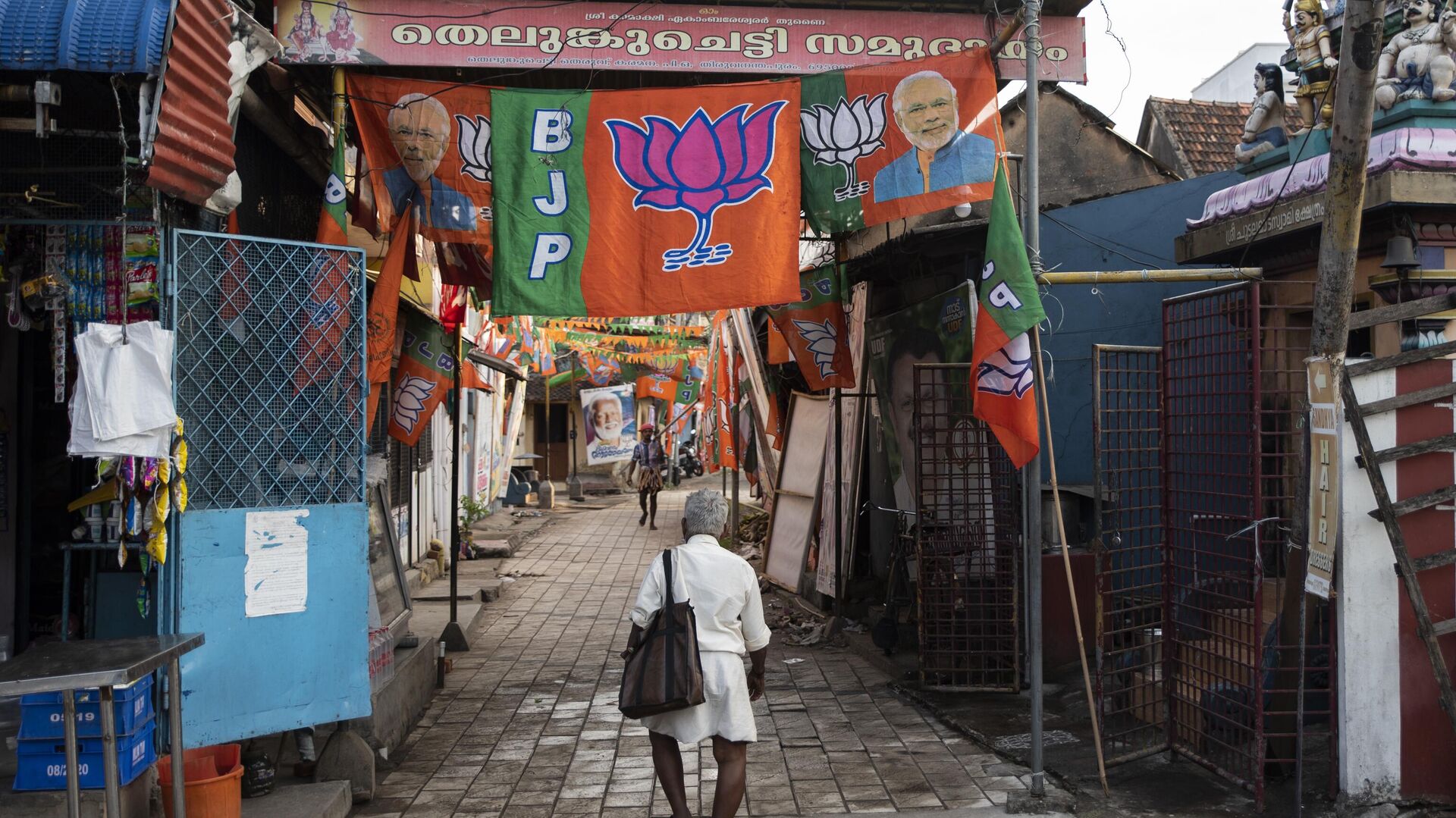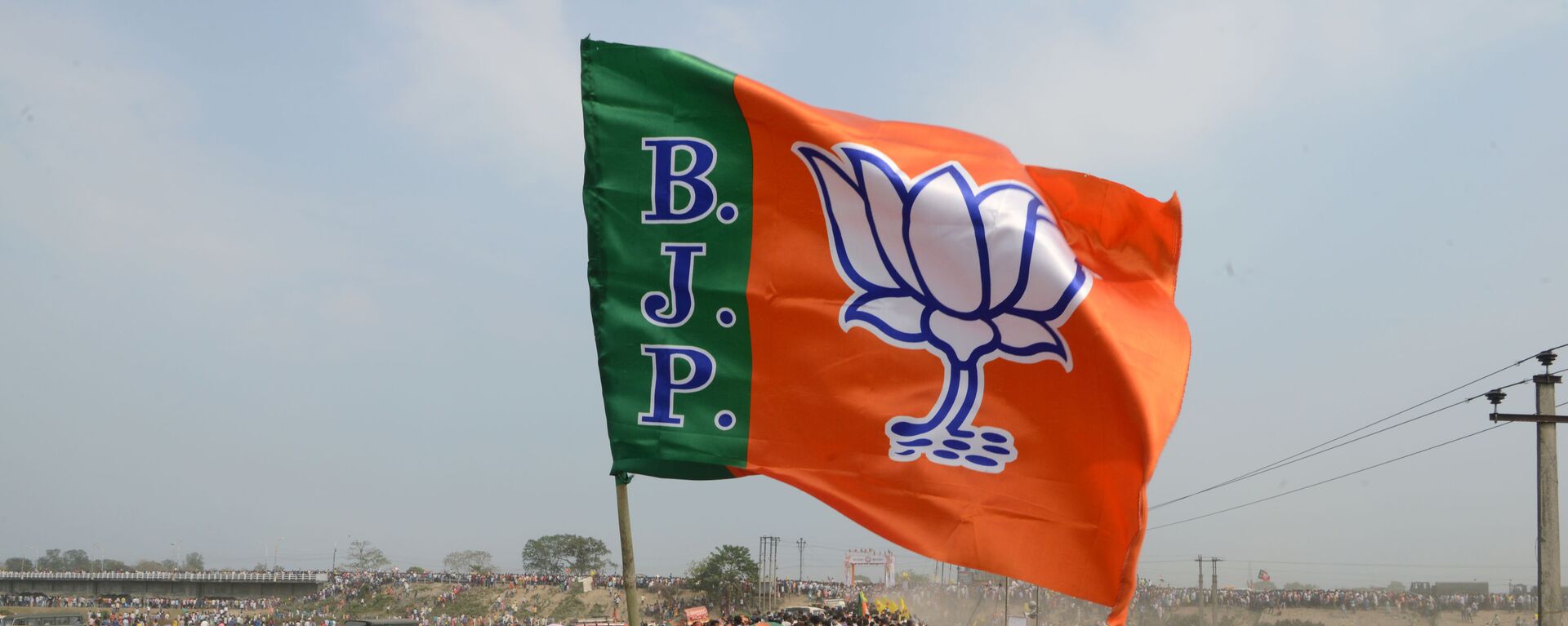https://sputniknews.in/20230406/birth-and-ascendance-of-bjp-indias-ruling-party-marks-44th-foundation-day-1448488.html
Birth and Ascendance of BJP: India's Ruling Party Marks 44th Foundation Day
Birth and Ascendance of BJP: India's Ruling Party Marks 44th Foundation Day
Sputnik India
The BJP, the world's largest political party, is celebrating its 44th foundation day today. In 1984, it had only two parliamentary seats but till 2023, it has formed two consecutive governments.
2023-04-06T18:21+0530
2023-04-06T18:21+0530
2023-04-06T18:21+0530
india
bharatiya janata party (bjp)
narendra modi
elections
hindu
https://cdn1.img.sputniknews.in/img/07e7/04/06/1452770_0:160:3076:1890_1920x0_80_0_0_f5efac7df4b3e3192bfed18b6328041e.jpg
A year ahead of the 2024 national election, Prime Minister Narendra Modi asserted on Thursday that only the Bharatiya Janata Party (BJP) has ensured social justice.Addressing party workers on the 44th Foundation Day of the ruling BJP, the PM said: "The opposition parties are very desperate. But no one can defeat the BJP in the 2024 election." "Parties fighting existential crises will keep conspiring against us, but the poor, deprived, Dalits (oppressed class), tribals protect the 'lotus' (BJP party symbol)," Modi said.Earlier, the BJP announced that it would be observing 'Samajik Nyay Saptah' (Social Justice Week), in which it plans to reach out to several sections of society to mark its foundation day starting Thursday.BJP's foundation day programs are reportedly scheduled in 14,000 locations in Delhi until April 14.India is also celebrating the Hanuman Jayanti, a Hindu festival celebrated to mark the birthday of the Hindu God Hanuman, this Thursday.When Was BJP Founded?Despite the BJP being officially formed in 1980, it originally derived its ideology from the Bharatiya Jana Sangh (BJS) created in 1951. At that time, Congress Party politician Syama Prasad Mukherjee left the party owing to differences of opinion and formed the BJS in collaboration with the Hindu nationalist organization Rashtriya Swayamsevak Sangh (RSS).The BJS aimed to protect Hindu identity and culture. In the 1952 general election, it won only three seats.During 1975-1977, a state of emergency was imposed by then Prime Minister and Congress leader Indira Gandhi. When the emergency was lifted after 21 months, the BJS merged into the Janata Party, where several opposition parties collaborated.How BJP Started to Gain TractionIn 1986, Lal Krishna Advani took charge of the BJP, strongly advocating for the construction of a temple to Lord Rama at Ayodhya, his birthplace, in Uttar Pradesh state. In the 16th century, Muslim rulers allegedly destroyed Lord Rama's temple and constructed a Babri mosque. Since, a huge controversy has ensued between Hindus and Muslims over the ownership of the land. The first-ever suit with respect to the Ram Janmabhoomi dispute was filed during British rule in 1885.In 1989, Advani launched a nationwide 'Rath Yatra' (Hindu procession) from Gujarat state's Somnath to Uttar Pradesh's Ayodhya, drawing tens of thousands of people from different parts of the country. The yatra received huge support in rural places, especially among Hindus. When the yatra concluded, Advani was arrested under the National Security Act.However, on December 6, 1992, many Hindu groups, including Vishwa Hindu Parishad (VHP) and Rashtriya Swayamsevak Sangh (RSS), gave a call to hold a huge rally where speeches were made by many leaders, including BJP's senior politician Advani. Later in the day, the mosque was demolished by the mob.It is said that over 150,000 Hindu supporters were involved in demolishing the mosque, and over 2,000 people died in the riots that followed the incident across the country.At that time, Congress was in power at the federal level and the BJP was ruling the Uttar Pradesh state. In November 2019, India's Supreme Court ruled to handed over the disputed site in Ayodhya to Hindu claimants, allowing the construction of a Ram temple under government supervision and a part of its vicinity to the Muslims to build a mosque.BJP's First Federal GovernmentIn the 1996 national election, BJP emerged as the single largest party with 161 seats, and its leader Atal Bihari Vajpayee was sworn-in as prime minister. However, the government lasted only 13 days as he failed to prove the majority.In 1998 again, the BJP won 182 seats, and Vajpayee became the prime minister of a coalition government with the National Democratic Alliance (NDA). The government collapsed after 13 months after the All India Anna Dravida Munnetra Kazhagam (AIADMK) withdrew its support.Only after the 1999 election did the BJP form a full majority government, and Atal Bihari Vajpayee became prime minister for a full term this time.After 2004, the BJP sat in opposition for two consecutive terms, before forming the Narendra Modi governments in 2014 and 2019.Of the 28 states in the country, the BJP is in power in 16, either directly or in coalitions with other parties.
https://sputniknews.in/20230324/polls-and-internal-rift-what-made-bjp-change-party-heads-in-four-states-1293452.html
india
Sputnik India
feedback.hindi@sputniknews.com
+74956456601
MIA „Rossiya Segodnya“
2023
Deexa Khanduri
https://cdn1.img.sputniknews.in/img/07e6/0c/13/138923_52:0:533:481_100x100_80_0_0_cadf23d341691fc65ff2b22fd1afe584.jpg
Deexa Khanduri
https://cdn1.img.sputniknews.in/img/07e6/0c/13/138923_52:0:533:481_100x100_80_0_0_cadf23d341691fc65ff2b22fd1afe584.jpg
News
en_IN
Sputnik India
feedback.hindi@sputniknews.com
+74956456601
MIA „Rossiya Segodnya“
Sputnik India
feedback.hindi@sputniknews.com
+74956456601
MIA „Rossiya Segodnya“
Deexa Khanduri
https://cdn1.img.sputniknews.in/img/07e6/0c/13/138923_52:0:533:481_100x100_80_0_0_cadf23d341691fc65ff2b22fd1afe584.jpg
bbjp foundation day, bjp history, bjp news, how bjp formed, when bjp formed, how bjp came in power,
bbjp foundation day, bjp history, bjp news, how bjp formed, when bjp formed, how bjp came in power,
Birth and Ascendance of BJP: India's Ruling Party Marks 44th Foundation Day
Deexa Khanduri
Sputnik correspondent
The BJP, the world's largest political party, is celebrating its 44th foundation day today. In 1984, it had only two parliamentary seats but now in 2023, it has formed two consecutive governments.
A year ahead of the 2024 national election, Prime Minister Narendra Modi asserted on Thursday that only the Bharatiya Janata Party (BJP) has ensured social justice.
Addressing party workers on the 44th Foundation Day of the ruling BJP, the PM said: "The opposition parties are very desperate. But no one can defeat the BJP in the 2024 election."
Modi said that the BJP was born to eliminate corruption, nepotism, and law and order challenges.
"Parties fighting existential crises will keep conspiring against us, but the poor, deprived, Dalits (oppressed class), tribals protect the 'lotus' (BJP party symbol)," Modi said.
Earlier, the BJP announced that it would be observing 'Samajik Nyay Saptah' (Social Justice Week), in which it plans to reach out to several sections of society to mark its foundation day starting Thursday.
BJP's foundation day programs are reportedly scheduled in 14,000 locations in Delhi until April 14.
Prime Minister Modi also cited various social welfare schemes, including the free ration scheme launched by the BJP, saying, "The BJP believes in and implements measures to ensure social justice as it is an article of faith for the party. Our party and party workers consistently derive inspiration from the values and teachings of [Lord] Hanuman Ji. India has emerged much stronger to face the ocean-like big challenges. On Hanuman Jayanti, I pray for his blessings to all," Modi said.
India is also celebrating the Hanuman Jayanti, a Hindu festival celebrated to mark the birthday of the Hindu God Hanuman, this Thursday.
Despite the BJP being officially formed in 1980, it originally derived its ideology from the Bharatiya Jana Sangh (BJS) created in 1951.
At that time, Congress Party politician Syama Prasad Mukherjee left the party owing to differences of opinion and formed the BJS in collaboration with the Hindu nationalist organization Rashtriya Swayamsevak Sangh (RSS).
The BJS aimed to protect Hindu identity and culture. In the 1952 general election, it won only three seats.
During 1975-1977, a state of emergency was imposed by then Prime Minister and Congress leader Indira Gandhi. When the emergency was lifted after 21 months, the BJS merged into the Janata Party, where several opposition parties collaborated.
However, in 1980, the Janata Party was dissolved, and the members of BJS formed the BJP.
How BJP Started to Gain Traction
In 1986, Lal Krishna Advani took charge of the BJP, strongly advocating for the construction of a temple to Lord Rama at Ayodhya, his birthplace, in Uttar Pradesh state.
In the 16th century, Muslim rulers allegedly destroyed Lord Rama's temple and constructed a Babri mosque. Since, a huge controversy has ensued between Hindus and Muslims over the ownership of the land.
The first-ever suit with respect to the Ram Janmabhoomi dispute was filed during British rule in 1885.
In 1989, Advani launched a nationwide 'Rath Yatra' (Hindu procession) from Gujarat state's Somnath to Uttar Pradesh's Ayodhya, drawing tens of thousands of people from different parts of the country.
The yatra received huge support in rural places, especially among Hindus. When the yatra concluded, Advani was arrested under the National Security Act.
The BJP went on to win 120 seats in the 1991 parliamentary election.
However, on December 6, 1992, many Hindu groups, including Vishwa Hindu Parishad (VHP) and Rashtriya Swayamsevak Sangh (RSS), gave a call to hold a huge rally where speeches were made by many leaders, including BJP's senior politician Advani. Later in the day, the mosque was demolished by the mob.
It is said that over 150,000 Hindu supporters were involved in demolishing the mosque, and over 2,000 people died in the riots that followed the incident across the country.
At that time, Congress was in power at the federal level and the BJP was ruling the Uttar Pradesh state.
In November 2019, India's Supreme Court ruled to handed over the disputed site in Ayodhya to Hindu claimants, allowing the construction of a Ram temple under government supervision and a part of its vicinity to the Muslims to build a mosque.
BJP's First Federal Government
In the 1996 national election, BJP emerged as the single largest party with 161 seats, and its leader Atal Bihari Vajpayee was sworn-in as prime minister.
However, the government lasted only 13 days as he failed to prove the majority.
In 1998 again, the BJP won 182 seats, and Vajpayee became the prime minister of a coalition government with the National Democratic Alliance (NDA). The government collapsed after 13 months after the All India Anna Dravida Munnetra Kazhagam (AIADMK) withdrew its support.
Only after the 1999 election did the BJP form a full majority government, and Atal Bihari Vajpayee became prime minister for a full term this time.
After 2004, the BJP sat in opposition for two consecutive terms, before forming the Narendra Modi governments in 2014 and 2019.
Of the 28 states in the country, the BJP is in power in 16, either directly or in coalitions with other parties.



